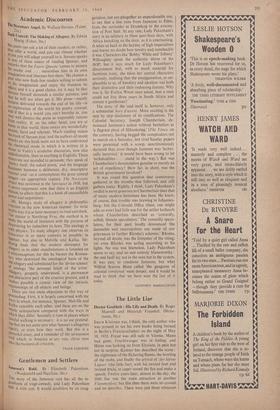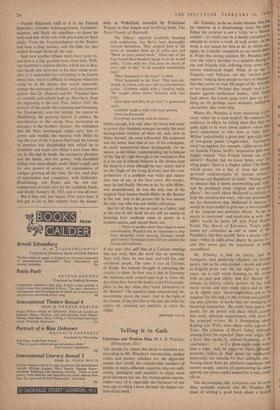The Little Liar
ERICH KXSTNER was, I think, the only author who was present to see his own books being burned in Berlin's Franzjosefsplatz on the night of May 10, 1933. Freud was still safe in Vienna; Mann had gone; Feuchtwanger was in hiding; and Heine was looking on from Elysium, in pain but not in surprise. Kiistner has described the scene : the nightmare of the flickering flames, the howling of the mobs, and finally the arrival of 'der kleine Liigner' (the little liar), with his twisted foot and twisted brain, to caper round the fire and make a speech. Twelve years later, almost to the day, the little liar was the main attraction at another Flammenfest; but this time there were no crowds and no speeches. There were just three witnesses
—Werner Naumann (still at it in the Federal Republic), Gunther Schwaegermann, Goebbels's adjutant, and Rach, his chauffeur—to douse his body and that of his wife with petrol and set them alight. From the Franzjosefsplatz to the Bunker had been a long journey, and the little liar had waded through blood all the way.
And now another fifteen years have gone by, and here is a big, goodish book about him. With- out Goebbels's copious diaries, which are in Rus- sian hands and have not so far been made avail- able, it is impossible for everything to be known about him; but it is difficult to imagine what else could be in the diaries that would materially change the elaborately detailed, well-documented picture that Dr. Manvell and Mr. Fraenkel have so carefully and soberly built up. Here he is, from the beginning to the end. First. before 1933; the poverty of his youth, the scheming and dreaming, the Dostoievsky and the talking, the course at Heidelberg; the growing interest in politics, the introduction to the young Nazi movement as secretary to the brothers Strasser, the realisation that the Nazi bandwagon might carry him to power and wealth; the meeting with Hitler (it was the year of the Locarno Pact) and the torrent of emotion and discipleship that welled up in Goebbels and made him Hitler's man from then on, in life and in death; the successive elections and the heady race for power, with Goebbels falling ever more deeply under Hitler's spell, and his own powers of oratory, of organisation, of intrigue growing all the time; the last, mad days of negotiation and conspiracy, with Schleicher, Hindenburg, von Papen and the rest out- manceuvred at every turn by the confident Nazis; and finally January 28, 1933. and it was all over.
But it had only just begun. Five years later, it had got as far as this vignette from the dinner- table at Wahnfried, recorded by Friedelind Wagner in that unique and terrifying book, The Royal Family of Bayreuth:
'My FUhrer,' reported Goebbels, beaming with satisfaction, 'my Berlin boys thoroughly enjoyed themselves. They stopped Jews in the street or rounded them up in cafés and said "Show us your pocket-book." When one of the boys found three hundred marks or so, he would order, "Come with me. You have no proof of your right to this." It all sounded wonderfully
'What happened to the Jews?' I asked.
'What happened to the Jews! They were de- tained, of course, and were sent to concentration camps.' Goebbels added with a boastful smile, 'We caught about twelve hundred with that trick.'
'And when will they be set free?' I questioned again.
• Goebbels made a wide and royal gesture. 'Never in this world.' Everybody was busy with the dessert. . . .
Oddly enough, it is only after the Nazis had come to power that Goebbels emerges as easily the most distinguished intellect of them all, and, next to Hitler himself, the most influential. His judgment was far better than that of any of his colleagues; he really understood about propaganda, for in- stance, as did Hitler, understanding the technique of the 'big lie' right through to the realisation that it is no use if nobody believes it. He always kept his head in a crisis (though he very nearly lost it on the Night of the Long Knives), and his com- prehension of a problem was wider and clearer than that of any of the Nazi court. His loyalty, once he had finally thrown in his lot with Hitler, was unquestioned; he was the only one of the original Nazi leaders beside Hitler in the Bunker at the end. And in his private life he was almost the only one who was not wholly ridiculous.
But for all that, he was as mad as a hatter, and at the end of this book we are still no nearer to knowing how madmen came to power in a
modern nation, and stayed there, too. ' . . . There is another point that requires some consideration. Would it not be opportune to stop Jews altogether from entering German woods and forests? Nowadays Jews still run around the Grunewald in droves. . . .
If the man who said that at a Cabinet meeting was not mad, then the word has no meaning. Very well, then; he was mad, and told lies, and murdered people. The same is true of Christie, of Haigh. But nobody thought of entrusting the country to them. So how was it that in Germany the madmen took control and kept it, from the day when they burnt the books in the Franzjosefs- platz to the day when they burnt themselves in the Bunker? The question spins unanswered, un- answerable, down the years. And in the light of the flames, of the first fire or the last, the little liar capers on, mocking our inability to solve the riddle.
BERNARD LEVIN



































 Previous page
Previous page